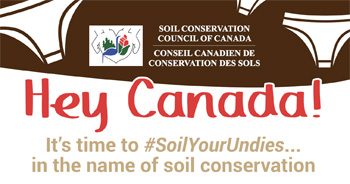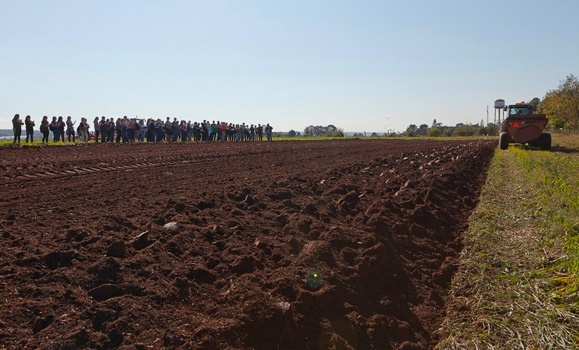While many gardeners are busy planting flowers or seeds this time of year, Dal's Faculty of Agriculture is planting something a bit unusual: underwear. And it’s all in the name of soil science and conservation.
The Faculty of Agriculture, along with community members, hosted a #SoilYourUndies event in the name of science April 19th in celebration of National Soil Conservation Week.
Participants buried 100 per cent cotton briefs, donated by Stanfield’s Ltd in the raised bed of the Horseshoe on the Agricultural Campus in hopes of better understanding the health of the earth beneath their feet.
Ideally, the cotton undies should decompose in the soil over time, leaving only the waistband, identified by the marker flags. The underwear will be left to decompose until July when they will be dug up at Dal AC’s annual Community Day on July 19.
If the underwear decomposes completely, the soil has good biological activity, which means healthy soil. If the undies are still intact, the soil is lacking in biological life, usually from overuse.
A community event, a national campaign
“An important part of our role as a centre for higher education in agriculture is to share the science of agriculture with our community,” says Colette Wyllie, community education officer at Dal AC. “Sometimes that means examining the intricate workings of things like nutrition systems, and sometimes it means burying underwear in the ground. The Soil Your Undies campaign is fantastic because it gets people talking about one of the most vital components of agriculture.”
 Although Dal AC hosted this community event, is a national campaign presented by the (SCCC). The campaign aligns with National Soil Conservation Week, which is celebrated from April 15-21 and encourages all Canadians to participate in the fun soil science experiment to better understand the health of your soil.Â
Although Dal AC hosted this community event, is a national campaign presented by the (SCCC). The campaign aligns with National Soil Conservation Week, which is celebrated from April 15-21 and encourages all Canadians to participate in the fun soil science experiment to better understand the health of your soil.Â
“More talk means more interest and more action,” says Colette. “We are thrilled to be working with SCCC and Stanfield’s for this event.”
The importance of good soil
Soil is often not given the credit it deserves. It is a living breathing system that provides nutrients and water to crops that produce our food and is an integral part of our environment. Roughly 95 per cent of the food we eat is produced in soil, so having healthy soil should be made a top priority to all Canadians. It is also home to billions of organisms that feed growing crops by turning dead plant material into useable nutrients. These organisms also help create soil organic matter, which holds water and reduces the risk of soil erosion.
“Soil heath and soil conservation are important, not just to Canadians but to everyone, because without soil we will not survive,” explains Kier Miller, eastern director with the Soil Conservation Council of Canada. “Without soil we simply cannot feed ourselves. And it’s not just soil health, its soil conservation as well. We are losing soil at an astounding rate. Whenever you see a river or stream of any kind that is brown and muddy that is soil being washed away.”
Despite the organisms in the soil helping to reduce erosion, healthy soil is increasingly under external stresses such as the expansion of cities, increased demand on soil to grow food for growing populations, changes in cropping, tillage and other practices and increased frequency of extreme weather due to climate change. The annual cost of soil degradation in Canada is estimated at over $3 billion each and every year, and this will only increase if nothing is done.
“Research has shown that many of the civilizations in our past disappeared because they could no longer feed their people,” Kier explains. “As their society grew they were required to grow more and more food to feed their growing population. As they demanded more and more from the soil it became more and more depleted, yields decreased and eventually they could no longer feed themselves.
"We are not there yet but we do have to figure out how to feed another 2.5 billion people in the next 20 odd years and many of those people will not be near where the food is being produced.”
How social health affects us all
While farmers are certainly responsible for the proper maintenance of the soil used to produce their crops, conservation is not entirely left up to them. Healthy soil is critical to the economic and environmental sustainability of the agri-food industry so we need to be sure to do our part to maintain healthy soil. Whether you have a backyard garden, or hundreds of acres of crops, we can all do our part to help protect the soil.
“We need to do less tillage because that destroys soil structure and more importantly destroys the biological life in the soil,” says Kier. “That life is what makes various nutrients available to the plants that are growing. It’s also helpful to ensure you always have something growing on your soil. After you harvest your garden, plant a mixture of seeds to get some green cover on that soil. It may not look like much but it does help feed that biological life in the soil and also keeps that soil in place.”
And all starts with planting a pair of cotton underwear.
Join the movement and bury your own pair of undies to better understand the biological activity that goes on underground in your yard. You may be pleasantly surprised, or you may find you need change your gardening habits. Whatever you find, be sure to share on social media with #SoilYourUndies and keep the conversation going all year long.
For more information on soil conservation, please visit .

